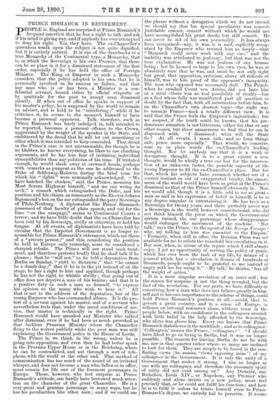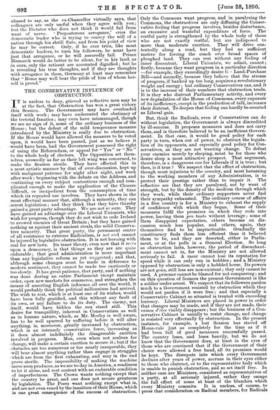PRINCE BISMARCK IN RETIREMENT. .
PEOPLE in England are surprised at Prince Bismarck's frequent assertion that he has a right to talk, and ask if his mind is giving way, and if anybody has ever attempted to deny his right. Yes, they have. The ex-Chancellor's querulous wrath upon the subject is not quite dignified, but it is entirely natural. It is one of the drawbacks to a true Monarchy of the Continental type, a Monarchy, that is, in which the Sovereign is his own Premier, that there can be no place in it for a dismissed statesman of the first order, especially if he has held the office of Foreign Minister. The King or Emperor in such a Monarchy considers that the policy adopted is his own, that he is personally involved in its success or failure, and that any man who is or has been a Minister is a con- fidential servant, bound either by official etiquette or by gratitude for the past to accept even dismissal silently. If when out of office he speaks in support of his master's policy, he is supposed by the world to remain an adviser, and is held to be " interfering ;" while if he criticises it, he seems to the monarch himself to have become a personal opponent. Talk, therefore, such as Prince Bismarck has lately indulged in, talk intended to be reported, becomes a personal offence to the Crown, aggravated by the weight of the speaker in the State, and embittered by the dread that he will let out something or other which it was intended to keep concealed. That dread in the Prince's case is not unreasonable, for though he is no blabber, he knows everything, he likes to use clinching arguments, and he has less fear of irritating individual susceptibilities than any politician of his time. If irritated enough, he would slash away at crowned heads, perhaps with remarks as pungent as the one he addressed to the Duke of Schleswig-Holstein during the brief term for which his " rights " were nominally acknowledged. "We have hatched the chicken," said the Prince, meaning his Most Serene Highness himself, " and we can wring its neck," a remark which extinguished the Duke, and his position and his claims, as summarily as the Elector Johann Sigismund's box on the ear extinguished the petty Sovereign of Pfalz-Neuburg. A diplomatist like Prince Bismarck, possessed of that faculty of plain speech, and out for the time "on the rampage," seems to Continental Courts a terror ; and we have little doubt that the ex-Chancellor has been told by his Sovereign, civilly or otherwise, to hold his tongue. At all events, all diplomatists have been told by circular that the Imperial Government is no longer re- sponsible for Prince Bismarck's utterances, which are those of a " private person ;" and this, considering the position he held in Europe only yesterday, must be considered a sharpish rebuke. The Prince will not stand such treat- ment, and therefore protests loudly that he shall talk if he pleases ; that he "will not," as he told a deputation from Berlin on Sunday, " yield to dictation ;" that " he cannot be a dumb dog ;" that if he is in the pit instead of on the stage, he has a right to hiss and applaud, though perhaps he has not the right to whistle shrilly ; that going out of office does not deprive a man of his brains ; and that it is a positive duty in such a man as himself, "to express his opinion to the many who wish to hear it." All that is not to the address of the deputation, but of the young Emperor who has commanded silence. It is the pro- test of a servant against his master, and of a servant who nevertheless feels that, under the usual conditions of ser- vice, that master is technically in the right. Prince Bismarck would have smashed any Minister who talked after dismissal, even if he had been as much provoked as that luckless Prussian Minister whom the Chancellor flung to the wolves publicly while the poor man was still explaining the Government policy in the House of Lords. The Prince is, we think, in the wrong, unless he is going into opposition, and even then he had better speak in the Prussian Upper House or in the Reichstag, where he can be contradicted, and not through a sort of tele- phone with the world at the other end. That method of communication has too much of the sound of an irritated whisper, and does not become a man who, fallen or in office, must remain for life one of the foremost personages in Europe. Those, however, who feel surprise at Prince Bismarck's attitude, can hardly have bestowed much atten- tion on the character of the great Chancellor. He is a very great and genuine personage in many ways, but he has his peculiarities like other men ; and if we could use the phrase without a derogation which we do not intend, we should say that his special peculiarity was conceit, justifiable conceit, conceit without which he would not have accomplished his great deeds, but still conceit. He can never be rid of his own personality. It has always been recognised—nay, it was, it is said, explicitly recog- nised by the Emperor who trusted him so deeply—that " Bismarck could never work with any one," and the inability was attributed to jealousy ; but that was not the true explanation. He was not jealous of any human being ; but he loomed so large in his own eyes, he was so absolutely sure that he was, and must be, not only right but great, that opposition, criticism, above all ridicule of himself, was to him proof of the opponent's incapacity. The man who opposed was necessarily dull. The Prince, when he crushed Count von Arnim, did not hate him as a rival—there was no real possibility of rivalry—but as a fool whose folly was manifested past all question or doubt by the fact that, with all information before him, he on the Chancellor's own dearest topic—the right way to manage France—took a totally different view. It is that the Prince feels the Emperor's ingratitude ; but we suspect, if the truth could be known, that his pre- dominant sensation is not bitterness, either for that or any other reason, but sheer amazement to find that he can be dispensed with. 'I. dismissed ; what will the State do ? At all events, I must talk, and so keep things safe, peace more especially.' That would, we conceive, sum up in plain words the ex-Chancellor's leading thought. Nor let anybody say that it is a weak or derogatory thought. It is to a great extent a true thought, would be wholly a true one but for the interven- tion of an unknown factor, the possible capacity of the young Emperor to fill the ex-Chancellor's place. But for that, which his subjects have assumed, whether out of a correct instinct or out of exaggerated loyalty, the amaze- ment of the world would have been as great at the Prince's dismissal as that of the Prince himself obviously is. Nor, we would add, though it is a little odd to see so great a man so naïf in his expression of belief in himself, is he in any degree singular in entertaining it. He has been as a Sovereign for twenty years, and there probably never was a Sovereign in the world, however constitutional, who did not think himself the pivot on which the Governmental system turned, the one personage whose disappearance would endanger the movement of the machine. ' Not talk,' says the Prince, to the agent of the Novoye Vremya f why, my talking to him was essential to the Empire.' " Formerly, when still in office, the Russian Press was not available for me to refute the manifold lies circulating in it.. But now, when, in virtue of the repute which I still always enjoy, I get an opportunity of serving the policy of peace, which has ever been the task of my life, by means of a journal which has a circulation in Russia of hundreds of thousands, people ought to be grateful to me instead of angry with me for using it." My talk,' he thinks, has all the weight of action.'
It is a most singular revelation of an inner self ; but the reason for surprise is not the thing revealed, but the fact of the revelation. For our parts, we have difficulty in conceiving how a man who does not believe greatly in him- self and in his own importance to the scheme of things, could hold Prince Bismarck's position at all,—could, that is, govern a great country, and in a sense all Europe, in reliance on internal resources alone, without trust in the people below, with no confidence in the colleagues around, with little belief in the help afforded by the Sovereign, who alone was above him. Every one knows that Prince Bismarck disbelieves in the multitude ; and as to colleagues : Colleagues,' muses the Prince, colleagues ? ' " I should have liked to go on living in Berlin, but it was no longer possible. The reasons for leaving Berlin do not lie with me, nor in that quarter either where so many are inclined to look for them. They are simply to be found in the con- flicting views [he means, 'views opposing mine'] of my colleagues in the Government. It is only the unity of a Government that makes it strong. I was no longer at one with my colleagues, and therefore the necessary spirit of unity did not exist among us." Any Dictator, any Richelieu, Louis XIV., or Napoleon, any Premier who suddenly and alone insists on a new policy, must feel precisely that, or he could not fulfil his function ; and how he is to fulfil it unless he trusts himself even to Prince Bismarck's degree, we entirely fail to perceive. It seems absurd to say, as the ex-Chancellor virtually says, that colleagues are only useful when they agree with you ; but the Dictator who does not think it would fail from want of nerve. Preposterous arrogance,' cries the democratic leader who is trying to convey the will of a nation through his shrill flute, and from his point of view lie may be correct. Only, if he ever tries, like most democratic leaders, to turn his followers, he must have just that arrogance, or he will assuredly fail. Prince Bismarck would do better to be silent, for in his land, as an ours, only the reticent are accounted dignified ; but he is revealing his true thoughts, and if they are thoughts with arrogance in them, Germany at least may remember that " Rome may well bear the pride of him of whom her- -self is proud."



















































 Previous page
Previous page